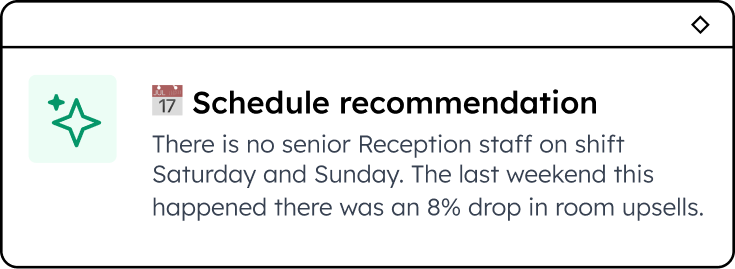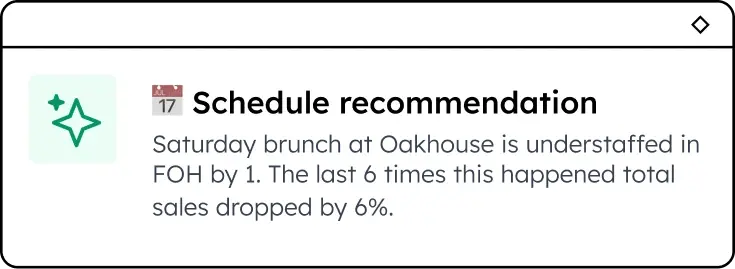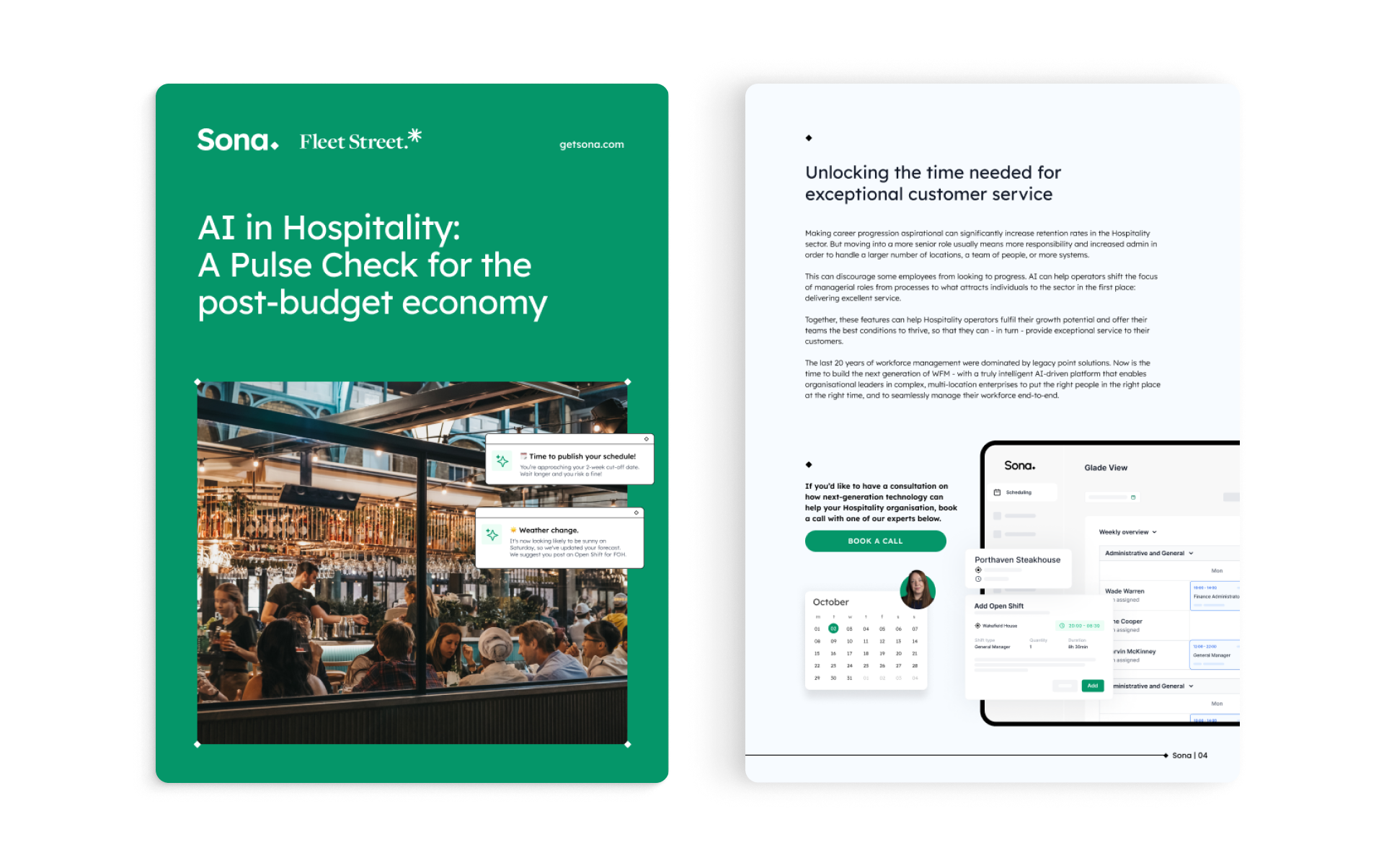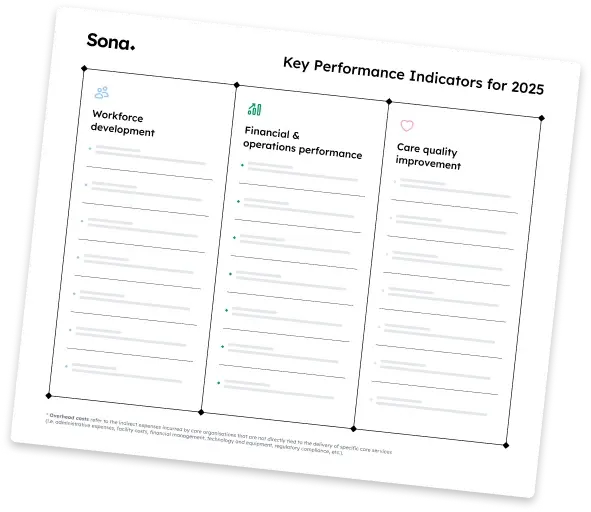Live & Digital events
Our regular online and in-person events tackle some of the biggest people challenges with the help of some of the sector's leading trailblazers.
Delivering better outcomes: How to recruit & retain more staff for a better care experience
31 October 2023 | 12:00PM GMT

MATTHEW BOND
CEO AND CO-FOUNDER
BORDERLESS

GERAINT JENKINS
OPERATIONS & ICT DIRECTOR
CARTREFI

OLI JOHNSON
CO-FOUNDER
SONA
12:00PM GMT
Consistency of care is essential to delivering excellent outcomes for your residents. Our experts will be covering how to ensure a great experience while managing the continuous challenge of recruiting and retaining staff.
See recording

MATTHEW BOND
CEO AND CO-FOUNDER
BORDERLESS

GERAINT JENKINS
OPERATIONS & ICT DIRECTOR
CARTREFI

OLI JOHNSON
CO-FOUNDER
SONA
12:00PM GMT
Further information
This what you can expect from the free webinar:
- Tried and tested recruitment tactics
Coming off of a successful ‘recruitment tour’ around Wales, Geraint Jenkins shares his insights on how expanding the search area was key for his organisation. - Simplifying international recruitment and retention
Matthew Bond covers how he created a platform to facilitate the sponsorship and induction process for employers looking to hire (and retain) international employees. - Using technology to deliver consistent care
Our Co-Founder, Oli Johnson hosts and offers more details on how technology can support organisations to deliver excellent care even when challenged with staff shortages.
Recording now available
Key learnings
Contents
- Value based recruitment is essential to delivering great outcomes.
- Recruitment isn’t about a single strategy, but a diverse approach.
- Organise recruitment workshops and promote what the job is all about: caring for others.
- International recruitment needs to become a viable growth path for Social Care organisations.
- A thorough onboarding process can alleviate retention concerns.
- Career growth opportunities are one of the biggest drivers of employee recruitment & retention.
Value based recruitment is essential to delivering great outcomes.
[12:00 - 14:00]
Oli opened up the conversation by focusing on strategies to drive up recruitment: “I think value based recruitment is the only recruitment that makes sense, as in [...] no amount of good skills can actually overcome the lack of the kind of right fit on the value basis.”
“We always try and prioritise values and personality over skills,” agreed Geraint. “There's no getting around the fact that the workforce is saturated. Everyone who wants a job in care is doing it already. And so you've got to find really good people that you can train across. […] You've got to prioritise values over experience and be willing to invest that time into people to train [them] well and induct well and wrap around new people to the sector.”
Recruitment isn’t about a single strategy, but a diverse approach.
[13:00 - 17:00]
When polled, the webinar audience chose a diverse mix of approaches they’ve tried in order to recruit more people. The guests agreed that it’s better to use multiple avenues, especially when under the pressure of staff shortages.
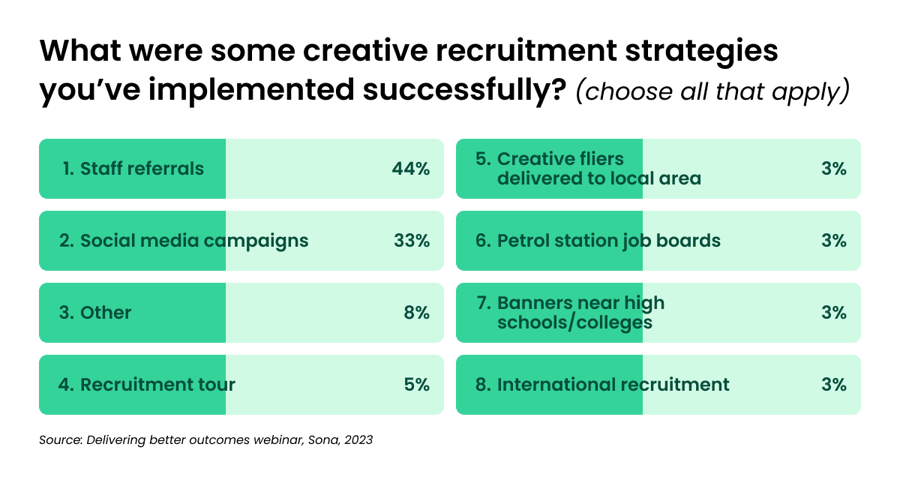
“I’ll say about recruitment in general that I don't think any one strategy is the right strategy. I think in a condition where the workforce is challenging, you always need to have many, many avenues and approaches,“ said Matthew.
Geraint also added his personal experience and highlighted how important being a part of the local community is for Social Care providers: “We've tried lots of different things. Communities work really well for us. So we have lots of success taking over local village halls and doing leaflet drops in communities and meeting local residents.
We engage quite heavily with workforces in the area […] so that the minute you hear of organisations winding up or closing or there's a turmoil for other job markets and other sectors in the area, we're quite quick to respond to that and support communities by saying: ‘You know, have you thought of a career in social care?’ and having that direct, proactive approach. That’s worked out well for us.”
Organise recruitment workshops and promote what the job is all about: caring for others.
[16:00 - 19:00]
Continuing on this topic, Geraint recommended to involve residents in the process, if possible:
“We've done workshops across Wales with stakeholders, so the people we support and our staff, and they've designed wanted posters of their perfect support worker to show what are the things they need from their staff and what are the values and what are the skills that are really important to them to live the lives that they want to in their community.
And that gives us so much rich material to, to then take into advertising campaigns and hyper, hyper local things. […] It really gets across what the sector's about and what the work's about in the process which I think helps people understand what it's about before joining.”
He adds that this helps with retaining new joiners: “There's a lot of people that leave the sector early on because the job wasn't what they thought it was. And so we try to overcome that by giving them as much upfront information as we can. So, we had a really successful recruitment all across Wales.”
International recruitment needs to become a viable growth path for Social Care organisations.
[24:00 - 26:00]
One method that more and more providers are exploring is international recruitment - something Matthew believes needs to become a mainstay of their overall staffing strategy.
“If you look at the number of workers in the UK and where the projections for demand for care is going, it [international recruitment] will just need to be a viable part of the UK's care sector workforce strategy, providing a well trodden, established and successful pathway to making the numbers,” said Matthew.
Estimates suggest that the Social Care sector will need an additional 480,000 staff by 2035, due to a combination of factors, including an ageing workforce and population.
A thorough onboarding process can alleviate retention concerns.
[19:00 - 22:00]
However, he acknowledges providers’ concerns in regards to retention and stresses that the onboarding process is essential for achieving long-term employment:
“I think there's also concern around […] how, what's the retention going to be like of those [international] staff. And actually, if you look at the data, international workers, sponsored workers are generally three times more likely to stay with you. They have three times better retention versus domestic staff. So, I think if you can make the right matches, if you do the process well, then you're going to find some phenomenal people and have a really, really great experience.”
Geraint confirmed from personal experience: “Our experience has been very small, but very positive. So the people that we have engaged on the sponsorship program have really worked out well. And that's been a positive experience.”
He makes sure to add that this is a sensitive process that requires a lot of support and not a quick-fix for understaffed organisations:
“I'm aware of other organisations that have really struggled to do it at scale. And I think a lot of the lessons that have been learned there around how much support you need. [...] People join the sector from different countries with different cultural approaches to support and, so sector orientation is really key. Also the pastoral support that needs to come around it, people need help to get embedded into teams and get embedded into communities and getting their housing sorted and getting school sorted for their families and, you know, getting all of that wraparound support is super important.”
“So we're on the cusp of that journey and we're not and we're not sure where that's going to take us, but we want to start small, do it well and then get better at it more than trying to use it as a reactive measure to plug the gaps. Where some people have been tempted down that road and it's not paid off because they haven't invested the time and support into it. So, yeah, I think that's a great shout. “
Career growth opportunities are one of the biggest drivers of employee recruitment & retention.
[38:00 - 40:00]
When asked about the KPIs they track for recruitment and retention, the audience focused on average employee tenure and the rate of new hires passing their probation period.
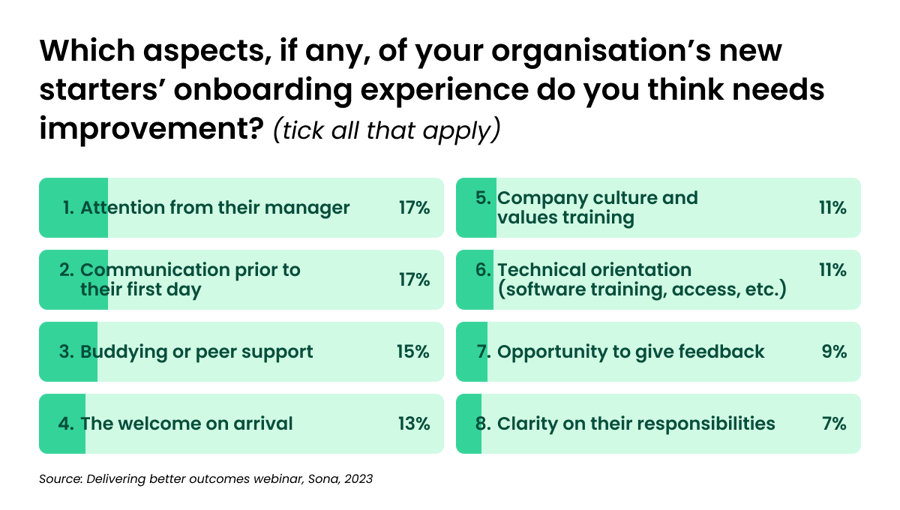
Geraint provided a lot of nuance to both of these KPIs, stressing the importance of promoting career opportunities in Social Care for both recruitment and retention:
“There's two milestones we found: six months [and one year]. If people stay with us for six months, the odds of them staying increase. After a year, it increases dramatically. So, if they've been with us a year, people tend to have long, long careers with us. And that's really lovely to see. [...] It just does emphasise how critical it is to hone in on young people joining the sector and wrapping around them.
We also like the track leavers’ data to see because we get lots of people who use us as a stepping stone and that's really lovely. So, lots of people leave us to become social workers and become health professionals and go on to do other great stuff. And that's great as well, cause that helps. As much as it's leavers’ data, it helps recruitment because you can show people a career pathway and [how] we support people to move on.”
Overall, the guests agreed that despite a challenging environment, there are a lot of recruitment and retention opportunities for providers who are engaged with their workforce and motivated to provide the best care possible for their residents.
Bring out the best in your team with Sona
See how you can effortlessly streamline staff management across multiple locations with Sona.
Book a demo
